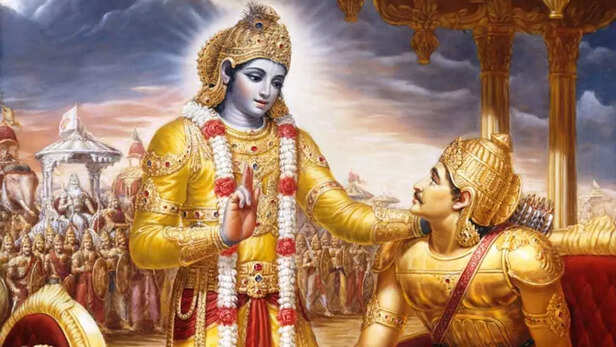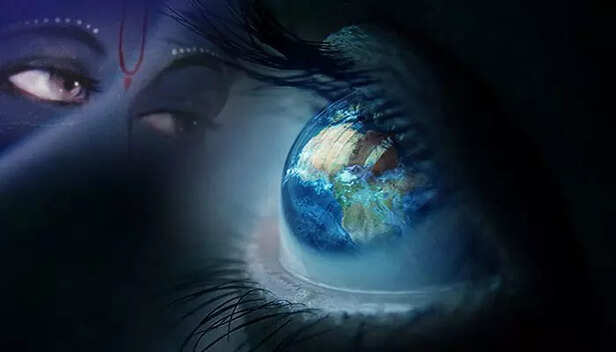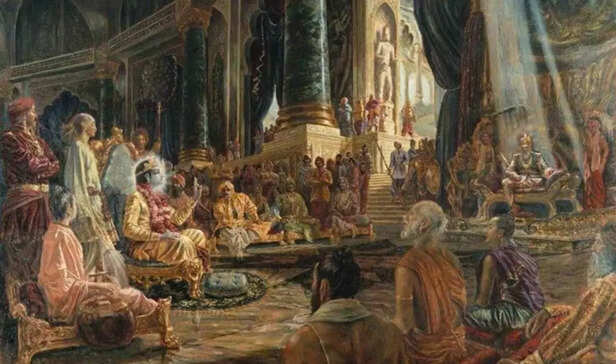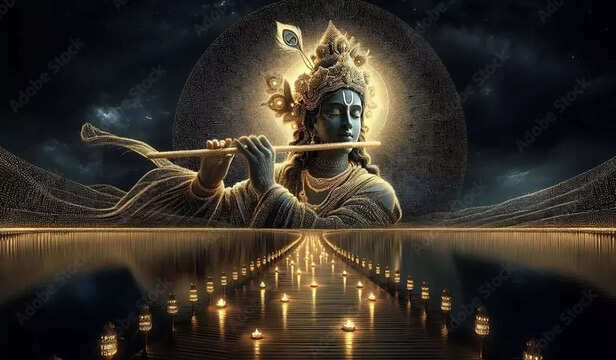The End is the Beginning, Desire is Attachment, Wish is Greed, Understanding is Knowledge, Expectations Are Suffering, Solitude is Happiness
Ankit Gupta | May 01, 2025, 11:29 IST
In the cosmic symphony of existence, beginnings and endings are illusions that veil the eternal dance of transformation. The phrase "The end is the beginning," attributed here to the wisdom of Krishna, is not a paradox but a profound spiritual truth. It suggests that every dissolution is a silent doorway to renewal, that death feeds the womb of rebirth, and that the conclusion of an experience is the fertile soil in which the seed of a new journey sprouts.
In the cosmic symphony of existence, beginnings and endings are illusions that veil the eternal dance of transformation. The phrase "The end is the beginning," attributed here to the wisdom of Krishna, is not a paradox but a profound spiritual truth. It suggests that every dissolution is a silent doorway to renewal, that death feeds the womb of rebirth, and that the conclusion of an experience is the fertile soil in which the seed of a new journey sprouts.
Krishna, as the cosmic charioteer in the Mahabharata, speaks not only to Arjuna but to every soul caught in the battlefield of life. His teachings transcend the historical context of Kurukshetra and reach into the heart of our everyday struggles. He unravels the invisible knots of desire, expectation, ego, and suffering, pointing toward a path of inner liberation. Each fragment of the original quote - "Desire is attachment, wish is greed, understanding is knowledge, expectations are suffering, solitude is happiness" - offers a key to unlock the cage of ignorance and taste the freedom of true self-awareness.

The Upanishads and the Gita repeatedly affirm that the universe is cyclical. Creation, preservation, and dissolution are not linear phenomena but interconnected rhythms of existence. Krishna tells Arjuna, "Never was there a time when I did not exist, nor you, nor all these kings; nor in the future shall any of us cease to be" (Bhagavad Gita 2.12). This eternal continuity reminds us that what we perceive as the 'end' is simply a change in form, a shift in consciousness.
Endings often terrify us because they threaten the identity we've built. The end of a relationship, job, or phase of life feels like death. Yet, just as the sun sets to rise again, each end is pregnant with possibility. Krishna encourages Arjuna to shed his fear, to embrace his dharma, and to trust the grand design. When we internalize this, despair transforms into devotion, and pain becomes a portal to divine insight.

Desire is natural. It arises from the senses, from comparisons, from impressions gathered over lifetimes. Yet when desire hardens into attachment, it becomes a shackle. Krishna warns, "When a man dwells on the objects of the senses, attachment to them is born; from attachment arises desire, from desire anger, from anger comes delusion, from delusion loss of memory, from loss of memory the destruction of intelligence, and from destruction of intelligence he perishes" (Gita 2.62-63).
This cascading spiral begins innocently. A wish for comfort or love seems harmless. But once it becomes a necessity for happiness, it births dependence. We start defining our well-being by how well the world caters to our desires. This entraps the soul in an endless chase, where the fulfillment of one desire only breeds another. In contrast, Krishna advocates for a state of Vairagya - dispassion. Not repression, but mastery over the senses, where desire arises but does not dictate.
Wish is Greed

Greed is not only the accumulation of wealth but also the endless hunger for experiences, validations, pleasures, and power. A wish becomes greed when it ceases to have boundaries. In the Mahabharata, Duryodhana's greed for the kingdom, despite having his own, led to destruction. In contrast, Krishna, though the supreme being, lived simply, often as a cowherd, detached from possessions.
Modern life fuels greed under the guise of ambition. We are told to want more, achieve more, consume more. Yet this 'more' is a mirage. The more we drink, the thirstier we get. Greed is the mind’s way of filling the void created by disconnection from the self. Krishna's life exemplifies that fulfillment comes not from external abundance but from inner contentment. A yogi who owns nothing is often richer than a king who owns everything.
Understanding is Knowledge

In the digital age, information is abundant, but understanding is rare. Knowledge (Jnana) is not the accumulation of facts but the dawning of clarity. Krishna emphasizes this in the Gita: "Among thousands of men, one may strive for perfection, and of those who strive, one may know Me in truth" (Gita 7.3).
Understanding arises when the mind is still, when the ego dissolves, and the soul glimpses reality without distortion. It is the moment Arjuna sees Krishna's Vishvarupa - the cosmic form - and realizes that the divine is not just a being but all of existence itself. Such knowledge is transformative. It breaks illusions, purifies intent, and aligns us with Dharma.
Expectations are Suffering

The subtle thief of peace is expectation. We expect the world to treat us fairly, our loved ones to understand us, our plans to succeed, and life to unfold as per our imagination. When it doesn’t, we suffer. Krishna says, "Let a man lift himself by his own self; let him not degrade himself. For the self alone is the friend of the self, and the self alone is the enemy of the self" (Gita 6.5).
Expectations are externally anchored, while Krishna points inward. Action is our right, not the fruit thereof. When we act with purity but surrender the outcome, we become free. This is Karma Yoga. It is not passivity but a powerful shift from attachment to action to surrender in action. The mature soul learns to serve without demand, to love without condition, and to live without clinging.
Solitude is Happiness

Solitude is not loneliness. It is the gentle embrace of one’s own presence. In a noisy world, solitude is radical. It is where the soul finds its original rhythm, where the mind cools, and where one communes with the divine. Krishna often wandered alone, played his flute under moonlight, or withdrew from politics to rest in the forests of Vrindavan.
True happiness does not arise from sensory overload but from inner harmony. In solitude, we meet the unchanging witness within—the Atman. This self, Krishna says, “is not slain when the body is slain” (Gita 2.20). It is eternal, luminous, and blissful. When one anchors in this awareness, even amidst chaos, peace prevails.
Awakening Through Reflection
"The end is the beginning. Desire is attachment. Wish is greed. Understanding is knowledge. Expectations are suffering. Solitude is happiness." These are not just poetic lines; they are spiritual signposts. They remind us that life’s true journey is inward, that the soul’s liberation lies not in controlling the world but in mastering oneself.
Krishna, the playful flute-player, the wise charioteer, and the cosmic form, is ultimately a reflection of the highest potential within us. He doesn’t merely preach – he embodies the path. To live inspired by Krishna is to live with courage, clarity, compassion, and calm. It is to dance amidst change, smile through uncertainty, and love without fear.
Let us not merely read his words, but breathe them. Let us not only admire his wisdom, but walk it. For in doing so, we shall find that every end is indeed a new beginning, and every step inward is a step toward eternal joy.
Krishna, as the cosmic charioteer in the Mahabharata, speaks not only to Arjuna but to every soul caught in the battlefield of life. His teachings transcend the historical context of Kurukshetra and reach into the heart of our everyday struggles. He unravels the invisible knots of desire, expectation, ego, and suffering, pointing toward a path of inner liberation. Each fragment of the original quote - "Desire is attachment, wish is greed, understanding is knowledge, expectations are suffering, solitude is happiness" - offers a key to unlock the cage of ignorance and taste the freedom of true self-awareness.
The Cyclical Nature of Endings and Beginnings

Battlefield Discourse (Image Credit: TOI)
The Upanishads and the Gita repeatedly affirm that the universe is cyclical. Creation, preservation, and dissolution are not linear phenomena but interconnected rhythms of existence. Krishna tells Arjuna, "Never was there a time when I did not exist, nor you, nor all these kings; nor in the future shall any of us cease to be" (Bhagavad Gita 2.12). This eternal continuity reminds us that what we perceive as the 'end' is simply a change in form, a shift in consciousness.
Endings often terrify us because they threaten the identity we've built. The end of a relationship, job, or phase of life feels like death. Yet, just as the sun sets to rise again, each end is pregnant with possibility. Krishna encourages Arjuna to shed his fear, to embrace his dharma, and to trust the grand design. When we internalize this, despair transforms into devotion, and pain becomes a portal to divine insight.
Desire is Attachment

The Web of Longing
Desire is natural. It arises from the senses, from comparisons, from impressions gathered over lifetimes. Yet when desire hardens into attachment, it becomes a shackle. Krishna warns, "When a man dwells on the objects of the senses, attachment to them is born; from attachment arises desire, from desire anger, from anger comes delusion, from delusion loss of memory, from loss of memory the destruction of intelligence, and from destruction of intelligence he perishes" (Gita 2.62-63).
This cascading spiral begins innocently. A wish for comfort or love seems harmless. But once it becomes a necessity for happiness, it births dependence. We start defining our well-being by how well the world caters to our desires. This entraps the soul in an endless chase, where the fulfillment of one desire only breeds another. In contrast, Krishna advocates for a state of Vairagya - dispassion. Not repression, but mastery over the senses, where desire arises but does not dictate.
Wish is Greed

Krishna Shanti Prastav ( Image Credit: pixel)
Greed is not only the accumulation of wealth but also the endless hunger for experiences, validations, pleasures, and power. A wish becomes greed when it ceases to have boundaries. In the Mahabharata, Duryodhana's greed for the kingdom, despite having his own, led to destruction. In contrast, Krishna, though the supreme being, lived simply, often as a cowherd, detached from possessions.
Modern life fuels greed under the guise of ambition. We are told to want more, achieve more, consume more. Yet this 'more' is a mirage. The more we drink, the thirstier we get. Greed is the mind’s way of filling the void created by disconnection from the self. Krishna's life exemplifies that fulfillment comes not from external abundance but from inner contentment. A yogi who owns nothing is often richer than a king who owns everything.
Understanding is Knowledge

From Information to Realization (Image Credit: Pixabay)
In the digital age, information is abundant, but understanding is rare. Knowledge (Jnana) is not the accumulation of facts but the dawning of clarity. Krishna emphasizes this in the Gita: "Among thousands of men, one may strive for perfection, and of those who strive, one may know Me in truth" (Gita 7.3).
Understanding arises when the mind is still, when the ego dissolves, and the soul glimpses reality without distortion. It is the moment Arjuna sees Krishna's Vishvarupa - the cosmic form - and realizes that the divine is not just a being but all of existence itself. Such knowledge is transformative. It breaks illusions, purifies intent, and aligns us with Dharma.
Expectations are Suffering

The Root of Disappointment (Image Credit: Pixel)
The subtle thief of peace is expectation. We expect the world to treat us fairly, our loved ones to understand us, our plans to succeed, and life to unfold as per our imagination. When it doesn’t, we suffer. Krishna says, "Let a man lift himself by his own self; let him not degrade himself. For the self alone is the friend of the self, and the self alone is the enemy of the self" (Gita 6.5).
Expectations are externally anchored, while Krishna points inward. Action is our right, not the fruit thereof. When we act with purity but surrender the outcome, we become free. This is Karma Yoga. It is not passivity but a powerful shift from attachment to action to surrender in action. The mature soul learns to serve without demand, to love without condition, and to live without clinging.
Solitude is Happiness

The Joy of the Inner Sanctuary ( Image Credit: Pixabay)
Solitude is not loneliness. It is the gentle embrace of one’s own presence. In a noisy world, solitude is radical. It is where the soul finds its original rhythm, where the mind cools, and where one communes with the divine. Krishna often wandered alone, played his flute under moonlight, or withdrew from politics to rest in the forests of Vrindavan.
True happiness does not arise from sensory overload but from inner harmony. In solitude, we meet the unchanging witness within—the Atman. This self, Krishna says, “is not slain when the body is slain” (Gita 2.20). It is eternal, luminous, and blissful. When one anchors in this awareness, even amidst chaos, peace prevails.
Awakening Through Reflection
Krishna, the playful flute-player, the wise charioteer, and the cosmic form, is ultimately a reflection of the highest potential within us. He doesn’t merely preach – he embodies the path. To live inspired by Krishna is to live with courage, clarity, compassion, and calm. It is to dance amidst change, smile through uncertainty, and love without fear.
Let us not merely read his words, but breathe them. Let us not only admire his wisdom, but walk it. For in doing so, we shall find that every end is indeed a new beginning, and every step inward is a step toward eternal joy.
